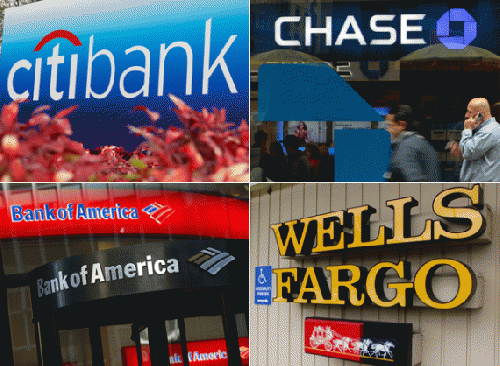Source: Campaign For America's Future
Have you heard? Goldman Sachs is "a shell of its former self."
Fortunately for its executives, this "shell" earned $8.91 billion in 2013, just a few short years after its leaders mismanaged it into the ground as its bankers committed serial fraud.
There's no reason to believe that the column that described Goldman as a "shell" was written by Wall Street lobbyists. But it probably didn't make them unhappy, either. That column, entitled "How Washington beat Wall Street," also asserted that "Washington went to war against big Wall Street banks hoping to blow up the kind of high-risk, high-reward strategies that helped spark the financial crisis."
Politico chief economic correspondent Ben White concludes that "Washington won in a blowout."
In this version of recent history, populist and reform-minded political leaders turned the "swashbuckling" wolves of Wall Street (there are other, more apt adjectives) into whimpering puppies ... and may soon make them an endangered species.
Is White right? He writes that Morgan Stanley, "Goldman's one-time bitter rival in the swashbuckling world of high-risk trading, is transforming into a staid money management firm ..." But a recent headline from Bloomberg News reads: "Morgan Stanley Tops Estimates on Record Brokerage Earnings." Bloomberg reports that Morgan Stanley "reported profit that beat analysts' estimates as equity-trading revenue increased and earnings from wealth management climbed to a record."
That's not bad for a "staid money management firm."
White notes that "Citigroup and Bank of America sold off many of their classic "Wall Street' businesses, including proprietary trading desks and private equity and hedge fund stakes, to comply with the Dodd-Frank financial reform bill." But concerned readers will be pleased to know that, despite these seemingly draconian requirements, those two institutions are getting along, thank you very much. "Bank of America Stock Looking Up As Fourth Quarter Profit More Than Quadruples," reads a headline from last week's Forbes. And while Citigroup missed analysts' earnings estimates, that was more a matter of expectations than anything else. Citi's net income for 2013 was $13.9 billion on revenues of $76.4 billion, up substantially from the previous year.
White notes that "mighty JPMorgan Chase ... is now forking over tens of billions of dollars in settlement cash, seemingly on a weekly basis, to pay for its sins before the financial crisis." (Some of those sins actually took place after the financial crisis -- and the fines appear to be far less than the extent of the actual damage the "mighty" bank did to its customers and the economy.)
White's right about one thing. There was a war -- but Wall Street won it. What's more, it's not satisfied with the billions it's already looted from our ransacked economy. It's counting on narratives like White's to help it get even more.
Consider this: Despite the fact that the bank paid $20 billion in fines in the last year alone, the only two arrests we've seen so far at JPMorgan Chase were those of low-level traders who were not U.S. nationals. There has been no systematic investigation of the institutional corruption that led to these enormous payouts, no attempt to determine how widely that corruption spread throughout the organization or how far up it has gone.
Nor are we talking about trivial offenses. The crimes committed at JPMorgan Chase include investor fraud, consumer fraud, perjury, forgery, bribery, violations of sanction laws against countries like Iran and Sudan, illegal foreclosures on active duty service members and their families " The list goes on and on and on.
Oh, we almost forgot: Bernie Madoff.
And yet, instead of truly paying for their sins, senior executives of JPMorgan Chase have continued to get wealthy at taxpayer expense. If that's "losing a war," every conqueror since Genghis Khan would have been happy to do the same.
Remember: Banks don't commit crimes. Bankers do.
But it would be unfair to single out any institution. Wells Fargo, which White describes as "a buttoned-down San Francisco-based bank," managed to evade criminal indictments over its subsidiary's active participation in laundering money for the Mexican drug cartels. Serious charges were leveled at Citigroup executives, including some who had been senior government officials. Investigators were stunned by Bank of America's foreclosure fraud abuses -- a practice that every major American bank indulged in, over and over. The lists of potentially indictable offenses at institutions like GE Capital and "shell of its former self" Goldman Sachs are, on the face of it, pretty overwhelming.
(Note: You can view every article as one long page if you sign up as an Advocate Member, or higher).






